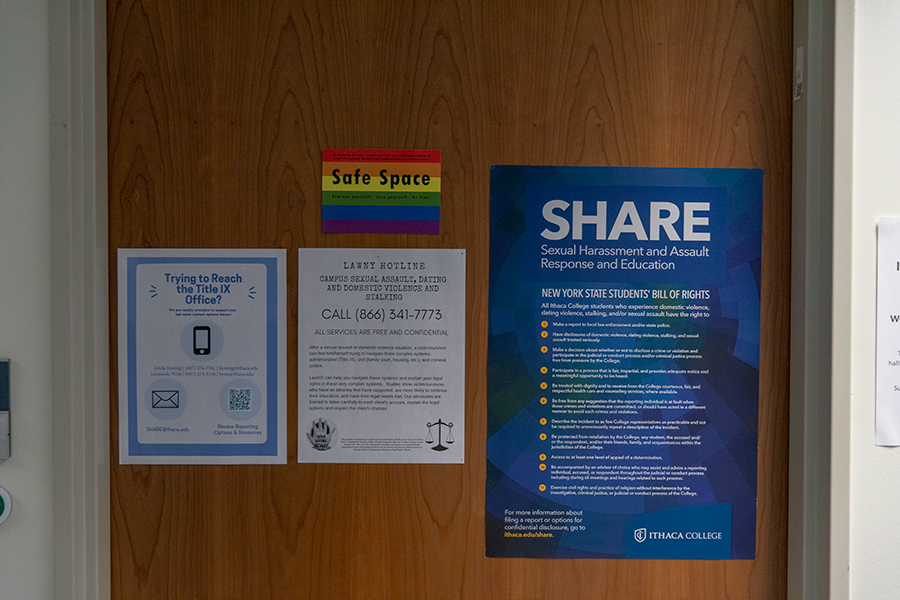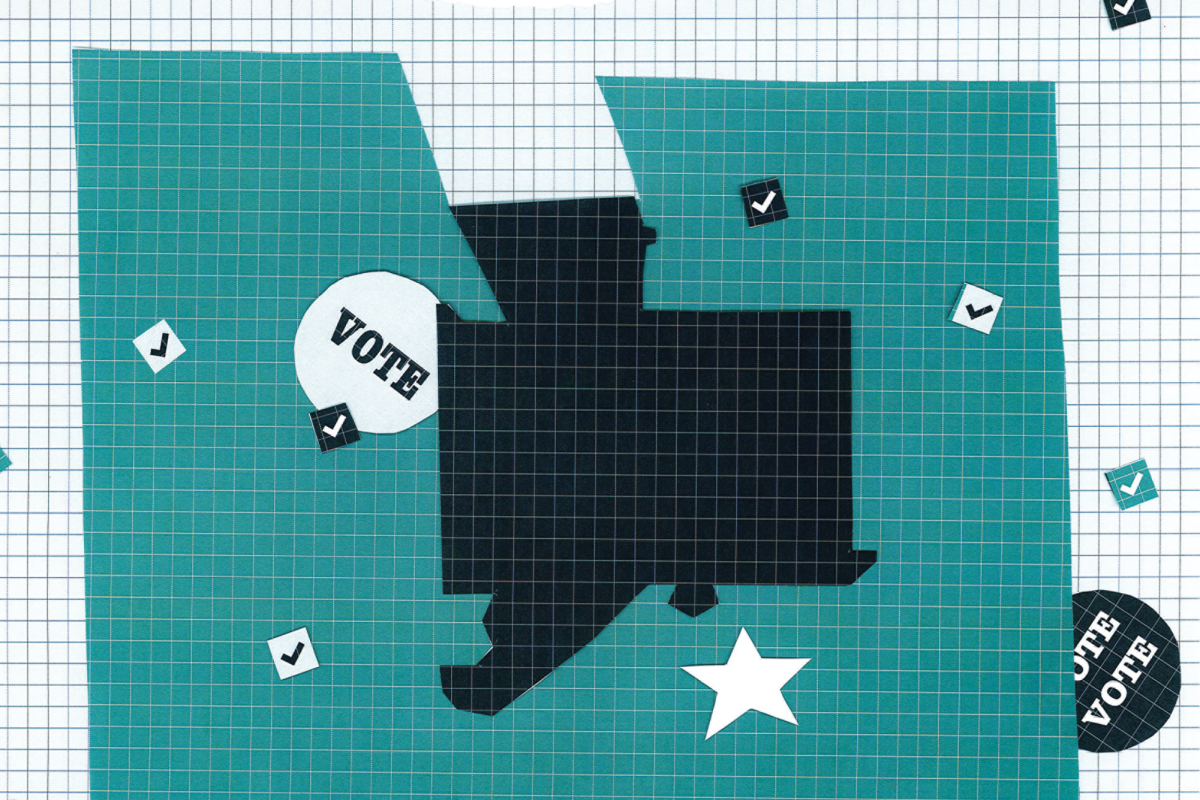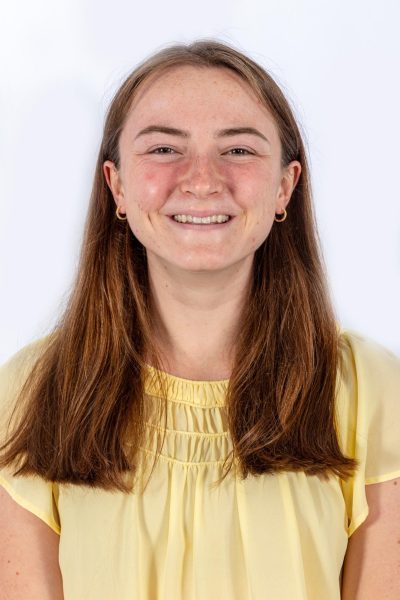As Ithaca College students returned to campus in January for the start of Spring 2024, many learned of a sexual abuse, harassment and Title IX lawsuit filed by a student against the college and Bryan Roberts, former associate dean of the Roy H. Park School of Communications.
The student, who is named as John Doe to protect his anonymity, alleges in the lawsuit that he was sexually abused and harassed by four then-employees of the college. The lawsuit says that from Fall 2021 to Spring 2023, Doe was “in an unwelcome, unsafe, threatening, and/or nonconsensual sexual relationship” with Roberts.
Senior Avery LaVergne, a Cinema and Photo major, said she felt jarred as she first learned about the allegations against Roberts through The Ithacan’s reporting. LaVergne said she met with Roberts for academic advising meetings when she was a sophomore in Fall 2021.
“I was extremely shocked, because it was the same time in which I was meeting with [Roberts] when he started that relationship with that student,” LaVergne said. “It was … uncomfortable to think that he was actively pursuing a student a year younger than I was romantically.”
Senior Alia Young, a writing for Film, TV and Emerging Media major, said she first heard about the lawsuit from YikYak posts — an anonymous online discussion forum for students — about The Ithacan article, and she believes that the college should have been more transparent and addressed the lawsuit from the start.
“I don’t think we should have found out through that article,” Young said. “I don’t think [the college was] covering it, they just weren’t really publicizing it that much. I think students have a right to know what was going on and not find out through outside sources.”
In a Jan. 22 email, President La Jerne Cornish; Melanie Stein, Provost and Senior Vice President for Academic Affairs; Bonnie Prunty, Vice President for Student Affairs and Campus Life; and Kirra Franzese, Associate Vice President and Chief Human Resources Officer, notified students that the college was named a defendant in the lawsuit and recognized that students may be affected by the allegations.
The email included information about reporting sexual misconduct through the Title IX Office, the Office of Human Resources and the Office of Public Safety; prevention and continuing education about sexual violence through the college’s Sexual Harassment and Assault Response & Education website; and mental health services from the Center for Counseling & Psychological Services (CAPS) for students who feel impacted by the lawsuit.
“We understand that you may have questions about the claims made in the lawsuit,” the email said. “It is important to note that the college generally does not comment on litigation, nor on confidential personnel matters. We believe that the most appropriate venue to respond to the allegations made in this complaint is through the legal system, and the college will do that at the appropriate time.”
Cornish also acknowledged the lawsuit during the All College Gathering Jan. 24.
Young said she has discussed the lawsuit with several Park students and they all feel that the lawsuit is very confusing and upsetting. She said she would like her professors to acknowledge the lawsuit and how it may impact students in class, but so far none of her professors have discussed it.
“[Park School professors] kind of acted like nothing happened,” Young said. “I don’t want to put that on the … teachers that I love in the Park School. … I don’t think it’s really their responsibility to be the ones to talk about it. I just wish they would maybe foster a better environment if students had questions or want to bring it up.”
Amy Falkner, dean of the Roy H. Park School of Communications, said she understands that students want to hear from Park faculty and administration about the lawsuit, but college faculty and staff cannot comment on the college’s legal proceedings.
“I wouldn’t expect professors — for the same reason I can’t comment on the litigation — that they wouldn’t be able to do anything other than say, ‘Yeah, there was a story in The Ithacan,’” Falkner said. “Nobody can actually say more than that.”
Falkner said she recognizes that the lawsuit may affect students across campus, so she and other college administrators decided that it would be best for central college administration to send an email to all students instead of sending a separate communication to Park students.
LaVergne said the allegations have completely shifted her view of the Park School. She said she still feels comfortable with the Park professors that she has built relationships with, but she now feels less safe within the Park School because Roberts allegedly used his position as associate dean to sexually harass Doe.
“It was really disturbing to realize that the power authorities at my own institution were using that in order to make sexual advances on another student,” LaVergne said. “Especially when you’re going to college when you’re away from your family, you’re expecting the adults around you to nurture and care for you. And … [Roberts] fell short of that job when downloading Grindr and supposedly doing this sort of thing for years.”
The lawsuit alleges that Roberts connected with Doe and other students on Grindr, a dating platform intended for members of the LGBTQ+ community. The lawsuit also alleges that Doe connected with Jack Bryant, associate professor and degree program director of Media Arts, Sciences and Studies, on Grindr.
A male student who uses Grindr and did not want to be identified because of safety concerns said he fears that because the alleged sexual harassment started over Grindr, the campus community will see an increase in homophobia and shaming people who use Grindr.
The student said Grindr has a poor reputation as an app used for dubious hookups, which contributes to the idea that queer people need to hide their sexuality. He said he wants to emphasize that the alleged sexual assault described in the lawsuit did not occur simply because Doe was using Grindr.
“The fact that this professor and our former [associate] dean engaged with students means that they were setting their age range to include students,” the student said. “So I don’t think it’s as simple as, oh, well, it just happens [on Grindr]. There is a certain degree of planning that has to be involved. I think, in some ways, they had to be actively seeking someone within the age range of people who they knew were students, especially with things like location settings. Whether or not there was a profile picture involved with this, they still had a lot of knowledge to assume that this person was a student at Ithaca College before they chose to engage with them.”
The student said he has heard much more concern from other students around campus about using Grindr because of the lawsuit. He said his friends have checked in with him to make sure that he is being careful while using the app.
According to its website, Grindr said it is “the largest social networking app for gay, bi, trans, and queer people. We have millions of daily users who use our location-based technology in almost every country in every corner of the planet.”
Grindr’s community guidelines state that “Grindr is a place for people of all shapes, sizes, ethnicities, genders, and identities to express themselves and their sexuality joyfully and freely.”
The student said that while there are some safety concerns to using Grindr, the app allows LGBTQ+ people to avoid awkward conversations or guesses about others’ sexuality. He said Grindr can provide a space for students who may not be comfortable with joining the campus LGBTQ+ affinity groups to connect with other queer people in the community.
“[Joining] it can kind of be a reaction to feeling isolated because of your sexuality,” the student said. “It can [seem] like the only avenue, especially for people who may not be comfortable with their sexuality who might want to keep their privacy safe.”
At the college, the Center for LGBT Education, Outreach, and Services provides a place for LGBTQ+ students to learn and ask questions about sexual health and safety. Crissi Dalfonzo, Director of the center and Lee Tyson, Pride Fellow at the center, are both confidential resources – which means students at the college can consult them about Title IX violations without having to make a report.
Brian Peterson, director of CAPS, said the lawsuit can prompt many layers of emotions for students, and he hopes they will consider speaking with a counselor to process their thoughts.
“Even if students aren’t directly involved, when a program is involved, and the reputation of a program is involved, we’ll have students talk to us about their perception of how safe IC is and what kind of supports they have, and ‘Is there someone I can talk to?’ and ‘How does what happened apply to me?’” Peterson said. “There’s no right or wrong reaction to things — you know, anger, sadness, confusion. … People process things differently. So whatever a person’s feeling is certainly something that we can talk about.”
Peterson said CAPS has not shared any communications directly related to the lawsuit with students, but it has tried to increase outreach with more Intercom posts about campus resources for students.
Peterson said CAPS is a confidential resource for students to discuss their concerns or report sexual assault. Two CAPS counselors, who have experience working with sexual assault survivors, serve as Title IX liaisons. CAPS also offers informational pamphlets about spaces like the Advocacy Center for students who are interested in off-campus resources. CAPS has weekly drop-in hours online and in six on-campus sites during Let’s Talk.
Falkner said she wants students to feel safe and know that faculty and staff are always trying to support them. She said faculty and staff have discussions about how to help with student belonging and learn about how to support students during faculty retreats.
“All the professors on this campus take student safety and health and well-being very seriously,” Falkner said. “Whether it’s academics, whether it’s student health, student mental health, I think, as a dean, my job is to make sure my faculty and staff understand, here’s all the resources that can help students, so if a student does come in, that they can say, ‘OK, I can direct you to the correct place.’”
Young said she thinks most students do not know how to use campus resources like CAPS and the Title IX Office. She said she believes the college should remind students about available resources for sexual assault and harassment more often, with thorough explanations about how the processes work.
“Because I’m an RA, I know more about it than most students do,” Young said. “We do have good resources. I think they should be broadcasted more that they’re there and not just in the times of crisis.”

















Jeff Uher • Mar 9, 2024 at 7:50 am
This is a rough situation. The Dean and any other faculty member involved breached a level of trust. If a student were to have contacted them, no pursuit of any kind of relationship should have proceeded. It’s tough for me to hold a college responsible for actions such as this by a faculty member, but regular meetings and discussions regarding student interaction should be conducted. As someone who worked in a corporate environment and had to investigate and terminate two employees for sexual misconduct, the damage can be difficult for the victim. Even in this day and age, being LGBTQ+ is hard. These persons need to be held accountable.